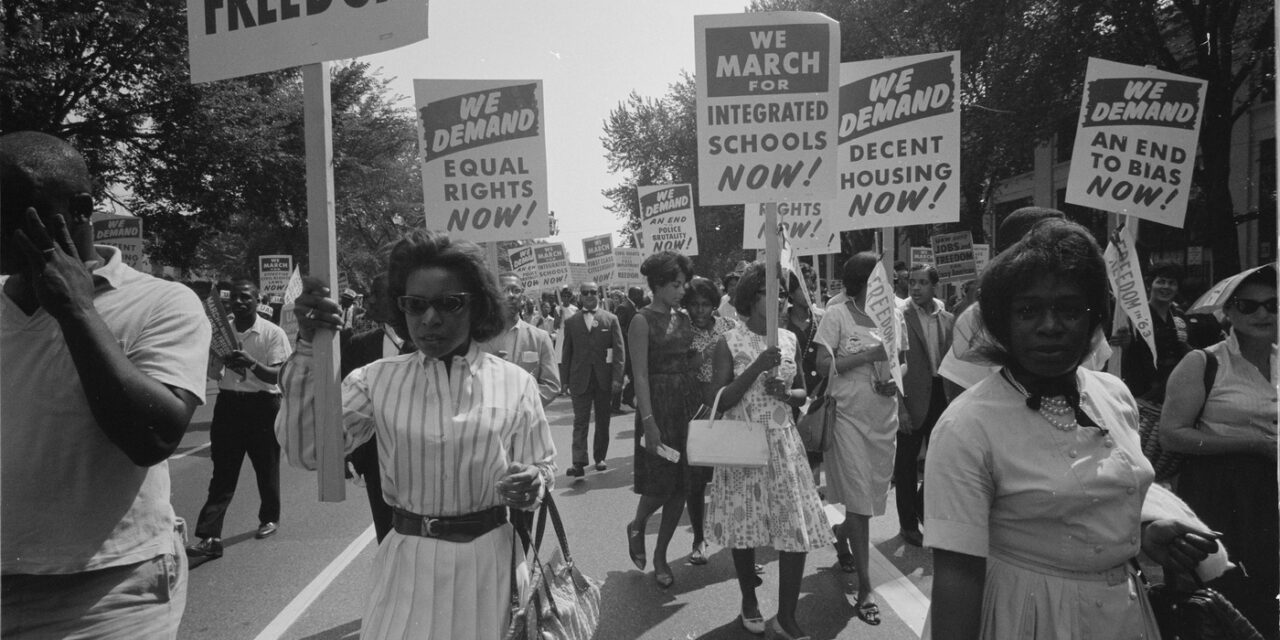Civil rights leader Dr. Martin Luther King Jr.’s iconic “I Have a Dream” speech on the steps of the Lincoln Memorial advocating for racial equality instilled hope in many Americans who attended the March on Washington for Jobs and Freedom in 1963.
More than 250,000 people participated in the historic civil rights event on Aug. 28, 1963. On the eve of the 60th anniversary of the March on Washington and at a time when hate crimes continue to rise in the United States, two sisters from Immaculate Conception Parish in Washington, D.C., who attended the march reflected on that experience and its importance today.
Sisters Joan Dodson Tillery and Sondra Dodson Raspberry grew up in Washington’s Georgetown neighborhood with their five other siblings. Their mother worked for the Treasury Department, and their father was a chauffeur for Chief Justice Earl Warren and a messenger at the Supreme Court.
Growing up, they attended Epiphany Catholic Church with their parents. Epiphany Church was established in 1923 by Black members of Holy Trinity Church, which was then segregated, who had asked the archdiocese for their own church.
“My grandmother grew up in Georgetown. They went to Holy Trinity Church. They had to worship on the balcony. My grandmother was one of, I don’t know how many, 20 families? That petitioned the archdiocese,” Dodson Tillery said. “They couldn’t receive Communion until after all the white people had received Communion.”
In 2022, the Pew Research Center reported that 77 percent of Black Catholics say opposition to racism is essential to what being Christian means to them.
Sixty years after the March on Washington, Dodson Raspberry, 84, and her sister, Dodson Tillery, 92, reflected on the cornerstone event.
“What I remember most was the congeniality of the group. Everybody seemed happy. Everybody seemed content and talked. We talked to each other. When the music was playing, we swayed with the music. When somebody was speaking, sometimes you couldn’t quite hear the various speakers. You knew it was a woman. You knew it was somebody prominent because the name was loud enough to hear. But everybody was waiting for Martin. And that was the call of the day: be there to hear him speak,” Dodson Tillery said.
Dodson Raspberry was working at the State Department and took the day off to attend the march.
“I had to do it because it was time for us to talk about equality in the United States of America,” Dodson Raspberry said.
She remembered an incident when she had to attend orientation in Virginia before working in Japan in 1960.
“The lady says to us, you can go anywhere for lunch that you would like…and so I went with all of the people who were in the orientation with me to this restaurant. I was the only Black person in the group. There was a man behind the warming table with his little white cap, and he rushed over and said, ‘No, no. You can’t come in here. No Blacks allowed, no Negroes allowed.” Dodson Raspberry said.
Dodson Raspberry went back to the Foreign Service Institute and ate a “dry cheese sandwich from the vending machine” with members of her orientation group.
“So now I’m back after two years, and it’s time for me to say, ‘Hey, I am equal to everybody else. I want to fight this fight because if I ever get married and have children, I don’t want to have them feel like they are second-class citizens. That’s the reason I went,” Dodson Raspberry said.
She noted that while she was in Japan for those two years, she felt significantly more comfortable as a Black person than in the United States.
“I felt in that crowd that I belonged right there, that this was going to be the beginning of something new. This was going to be it because there were thousands of people, Black and white, any color you wanted. Everybody was there for the same reason. I just felt, ‘Yes, this is it.’ I was happy when I went home. I was happy for a long time. And everybody was saying, ‘Get involved, get involved.’ It was just absolutely so wonderful,” Dodson Raspberry said.

Dodson Raspberry met her husband, the noted Washington Post reporter and columnist William Raspberry who died in 2012, at a March on Washington meeting a week before the demonstration.
“I had to be there to say, ‘I am an American with all rights, everything. Give me my rights. I don’t want to have anybody tell me no, I can’t do this.’ And I don’t want to say everything is nice in Washington, D.C., and you can go wherever you want. But then I travel somewhere else, and they’ve got segregation or the Jim Crow laws, and I can’t participate. I can’t go in a restaurant there. I can’t stay in a hotel there. That’s demeaning. That makes you feel, just makes you feel less than and that you are more than. That’s why I went to the March on Washington,” Dodson Raspberry said.
Dodson Tillery recalled the atmosphere that day.
“I remember the joy…if somebody was singing, they would sing along, kind of rocking [together,] and they would listen, and they would continue to talk among themselves and each other. Except when Martin came, nobody talked. Just everybody screamed when he was talking about, ‘I have a dream,’’” Dodson Tillery said.
She remembered the dark day when Dr. King was assassinated in 1968. The hope she and her sister felt at the March on Washington was drained.
“I was so angry,” Dodson Tillery said.
The sisters reflected on their experiences as Black women in practicing their faith. Dodson Raspberry attended what was then known as Immaculate Conception Academy in Washington, D.C., St. Joseph’s School in Alexandria, Virginia, and Trinity College, now Trinity Washington University, where she subsequently taught courses on African American women in fiction and film.
While at St. Joseph’s, Dodson Raspberry said she felt comfortable with some friends and with the Oblate Sisters of Providence, the first religious order of Black Catholic sisters in the United States, who ran the school.
“I’d been brought up in the Church comfortably with Black nuns who gave me the support and the courage and all of that to accept the Church,” Dodson Raspberry said.
Dodson Raspberry did recall a disrespectful incident while attending Immaculate Conception Academy, where she was one of two Black students. She was singled out to read a poem from Paul Laurence Dunbar, a revered Black poet from the late 19th and early 20th centuries, who was the son of enslaved Americans.
Dodson Raspberry was instructed to read his poem “In the Morning.” Like much of Dunbar’s work, this poem was written “in dialect” or African American vernacular English.
“That’s what I had to read to the class, and of course, they all cracked up,” Dodson Raspberry said. She noted later on that it was such a demoralizing moment that she told her parents when she got home, and her older sister was still able to recall the event during their interview.
Dodson Tillery attended elementary school in Georgetown, Dunbar High School, Francis Junior High (now School Without Walls at Francis Stevens,) and Miner Teachers College (which became District of Columbia Teachers College, which was then absorbed into the University of the District of Columbia in the late 1970s.) She also graduated from Howard University. She later went on to work as an educator in Baltimore public schools.
“I grew up in Epiphany Church in Georgetown, a Black church…(with) Black women who were staunch in church to get you to know the rituals and everything so that you were comfortable in your church,” Dodson Tillery said.
They both raised families rooted in the Catholic tradition, passing down their beliefs to their children.
Dodson Tillery remembers speaking to her daughter about being the only Black student in first grade at her Catholic school.
“We had to talk about differences, but she made friends and was very popular. So we talked about how things were different and how she could cope with differences. I think she did all right,” Dodson Tillery said.
Looking to the future, Dodson Raspberry hopes the Catholic Church strives to further its inclusivity and transparency.
“It would be nice if the Church would recognize everybody as being a whole in the Church and talk to everybody about whatever it is that is in the news affecting any one group of people…and how the Church is embracing everybody and for everybody,” Dodson Raspberry said. “And say, ‘we are a whole, the Church is a whole,’ and that as sisters, brothers, we are all together. This is what we strive for…and if you see anywhere or know anything that you think we have not discussed that we need to discuss, let’s talk about it.”




